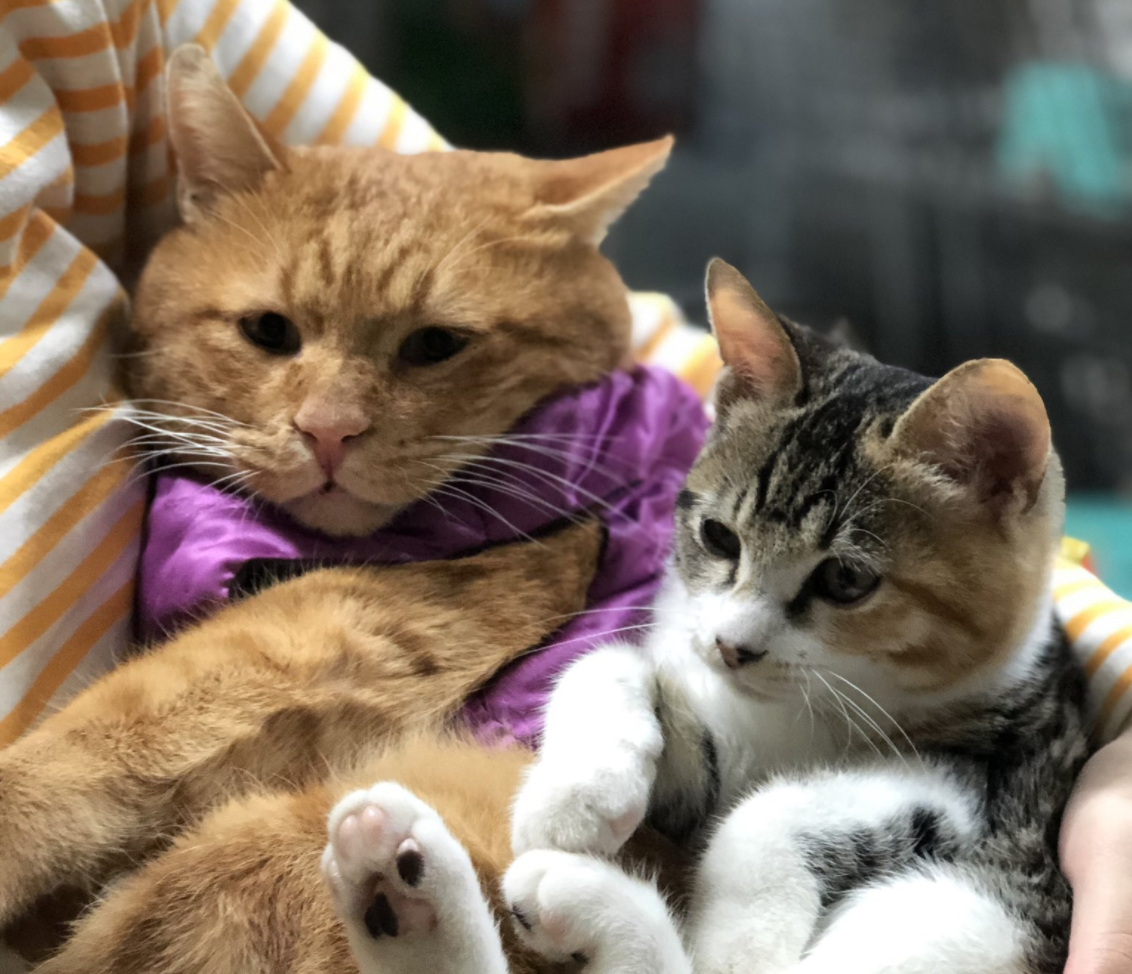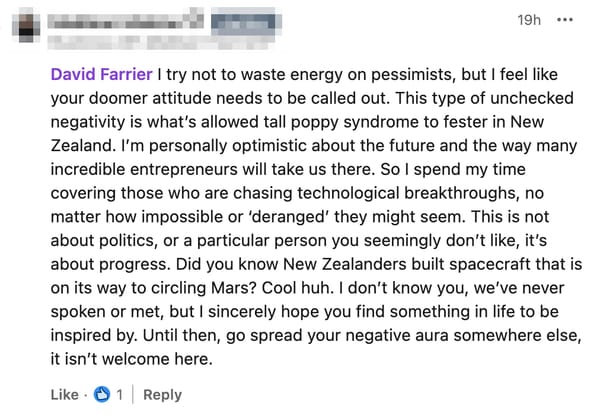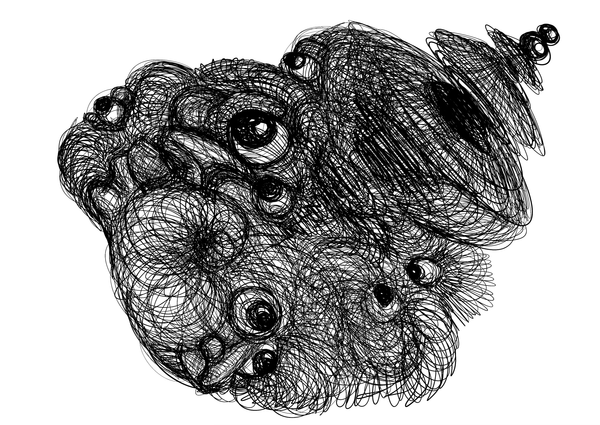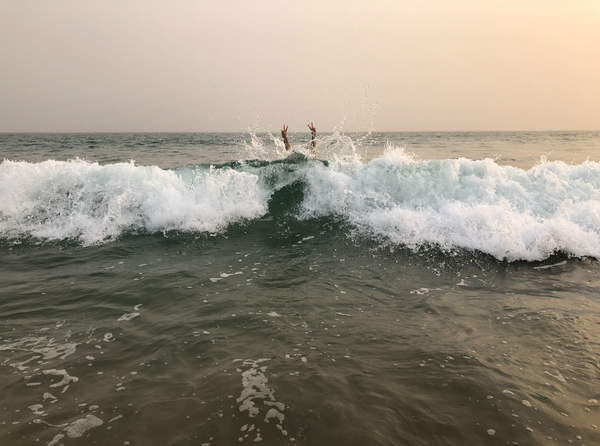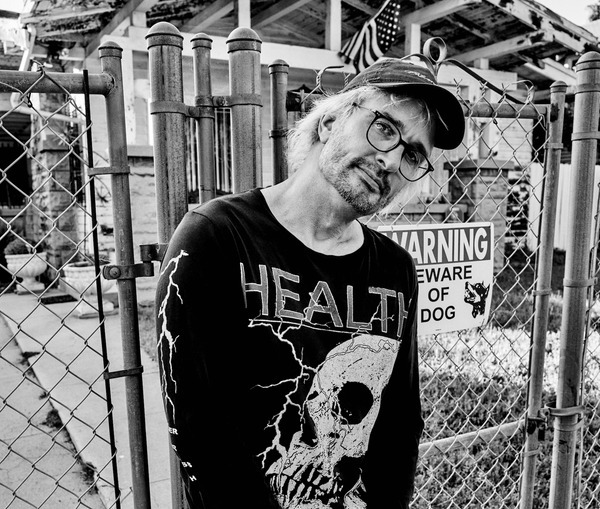I talk to someone who just got the Pfizer/BioNTech vaccine
"I started to get really excited about my immunity. Just being able to do normal stuff like smelling candles, or eating free food samples with no guilt or fear."
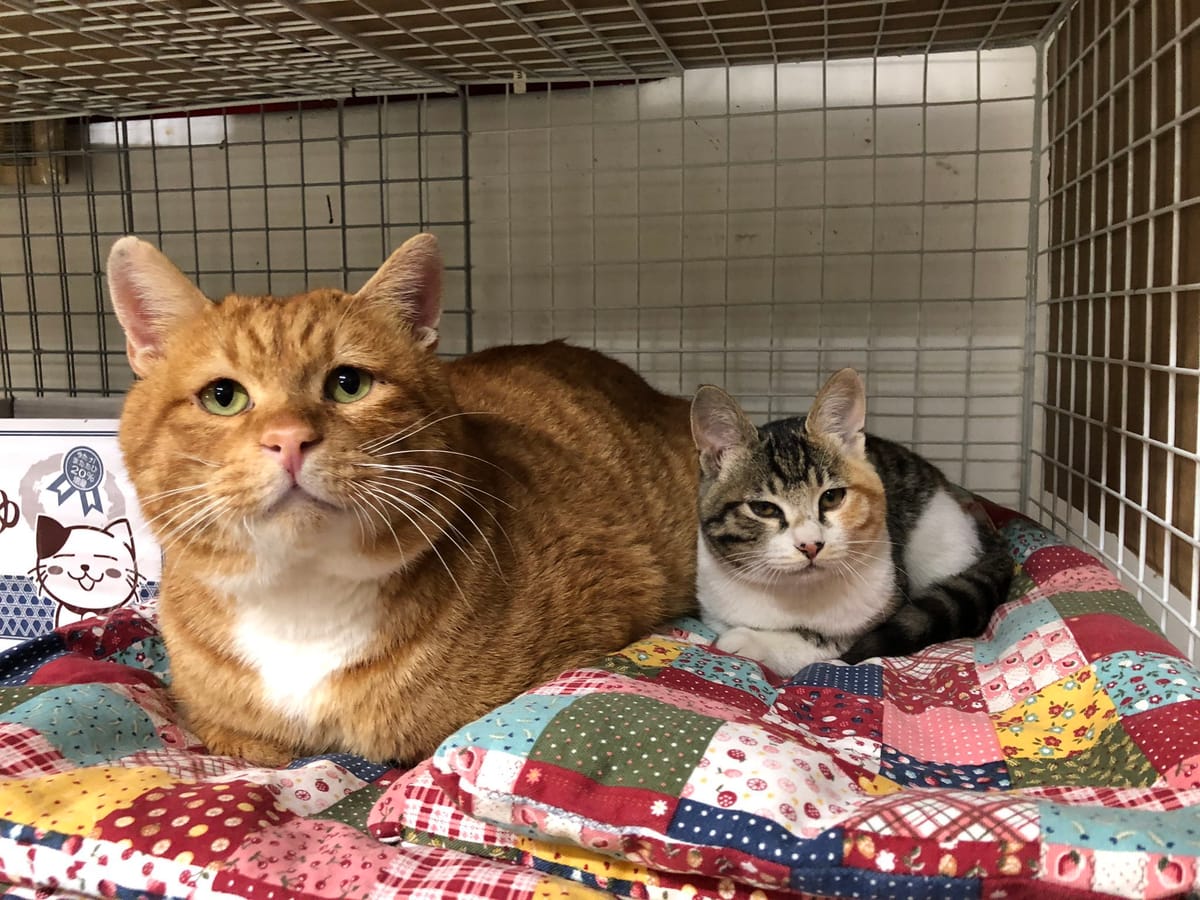
Hi.
Hope the week is treating you well. The highlight for me so far has been seeing this giant monster of a cat on Twitter (he’s up for adoption):

The account was Korean, but Nikita Hughes did some translating — informing me that the big giant monster is called Tae Pyung:
“Tae Pyung is made up of two Chinese characters, Tae (泰 meaning big) and Pyung (平 meaning peaceful). But “taepyung” is an actual word existing in the Korean language that means peaceful or laidback. The word is also used to describe having no care in the world.”
Nikita also informed me the normal sized cat is called “Snot”.
With that in mind, here in New Zealand former Member of Parliament Matt King shared this anti-vaccine nonsense on his Facebook page this week:
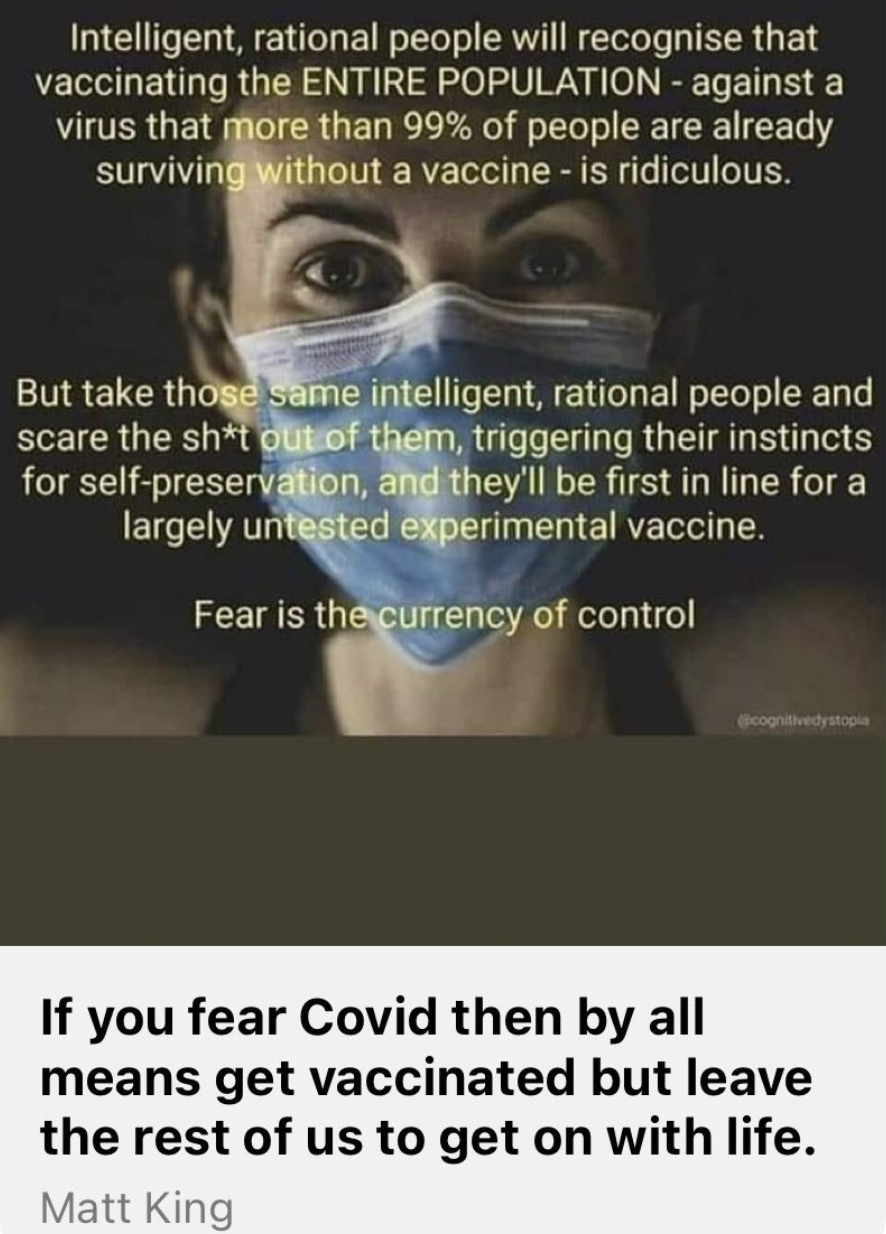
Matthew King was Member of Parliament for the National Party from 2017 to 2020. And last week, journalist Ethan Griffiths noticed Matt’s post about the COVID-19 vaccine:
“Looks like it has now been deleted, but this post by Matt King on his public Facebook page could be charitably described as a wee bit out there.”
I got in touch with Matt on Facebook to see if he had anything else to add. I started with my default line of enquiry, giving him the most obvious excuse on a plate if he chose to take it:
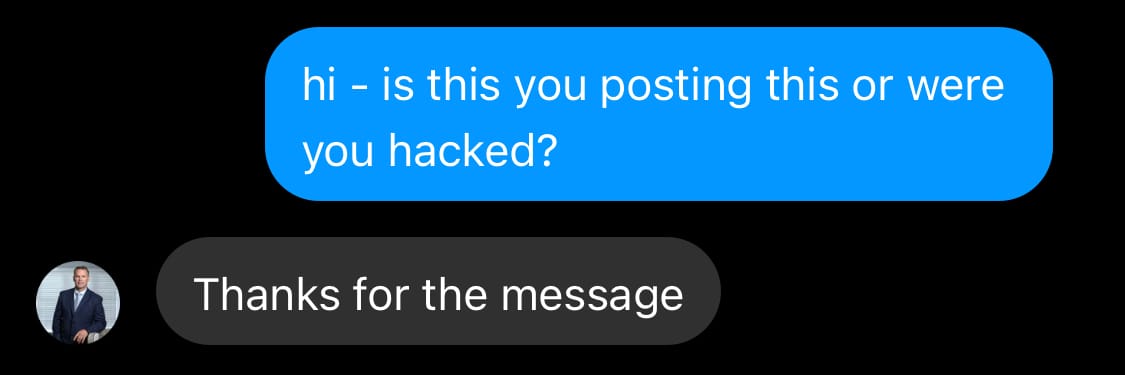
After his auto-reply, I sent a screenshot of his post. It remains sitting on “seen” with no comment from Matt.
The fact is, Matt’s post was hugely problematic — because the sooner we start vaccinating, the better. But don’t take my word for it. I reached out to Dr Siouxsie Wiles, a microbiologist based in New Zealand, and asked for her take on Matt’s post:
“There is so much fucked up about that statement, but let’s start with the central premise that more than 99% of people survive without a vaccine. A lot rests on what we mean by “survive”. The dictionary definition of the word is to continue to live or exist. So that is true, more than 99% of people will continue to live after having COVID-19.
But in what state?
We obviously now know about ‘long covid’, where some people have debilitating symptoms for months after their immune system has cleared the virus. So debilitating that they aren’t able to do many of the things they did before they got sick, like exercising or going to work. There are also reports of some people, even those who had a very mild illness, showing signs of things like heart, lung, brain, immune system, and kidney damage. That does not bode well for their future and will place a massive burden on healthcare systems in the years to come.
So yes, over 99% will survive COVID-19, but for many their lives will be changed for the worse.
And then there is the small matter of the 1% who don’t survive. Yes, they are more likely to be older and have some underlying health issue. But they are part of our community. They are our parents, grandparents, family, friends, neighbours, and colleagues. How could we wish them unnecessary harm?”
Matt’s post is reminiscent of a lot of the rubbish we’re seeing — and will continue to see — on social media this year.
I figured it was time for a bumper Vaccine edition of Webworm. I knew I wanted to talk more to Dr Wiles, but first, I wanted to talk to someone who’s actually had the vaccine. So I turned to Los Angeles — a current hotbed of COVID-19 that shows no signs of slowing anytime soon:
“The situation in Los Angeles County hospitals is so critical that ambulance crews have been advised to cut back on their use of oxygen and to not bring to hospitals patients who have virtually no chance of survival. Officials say they need to focus on patients with a greater chance of surviving…”
I knew healthcare professionals dealing with sick patients were among the first in the world to get the vaccine, so I tracked down a nurse in a busy Los Angeles hospital, who was kind enough to take some questions after their shift.
A conversation with a nurse who just got the vaccine.
Okay, so you’re a nurse that works in LA. Before we get into this vaccine stuff, can you tell me a little bit about what the last year has been like for you? I guess basically, are you OK?! I imagine it’s been hellish.
I don’t think I would describe myself as “OK”, more numb to the fear.
Back in February, everything was just unknown. No infection prevention or PPE guidelines had been setup for COVID yet. We didn’t even know if it was airborne or not. People were getting sent home with a strike if they wore masks around the unit. N-95’s were not allowed to be worn around the unit. My mentor as a new grad was fired for refusing to enter a confirmed-positive patient’s room without an N-95. He’d been a nurse there for over 20 years. Insanity!
All our supplies diminished within three weeks and we had to hot-glue gun face shields like arts & crafts. Our hospital ran out of Sani-Wipes and replaced them with a bucket of suspicious fluid and a stack of washcloths on each unit. This suspicious fluid was Virex, which we didn’t get any education on, and were wiping our face shields down with. People were getting rashes on their bodies from even small splashes of it.
I never cry at work unless I have a soft spot for a patient or their family, but I cried almost every shift in April. I was scared work was going to kill me. I was scared I was going to kill my roommates. I was scared of going to the store still in uniform and being ostracised. Appreciated, but ostracised simultaneously. Anyway, you can only be scared everyday like that for so long before you just become numb to it.
I don’t want to make this too bleak, but have you had any of your patients pass away from COVID-19?
I had a 29 year-old die last week. No health issues other than obesity. We had been trying to save him since mid-August.
The most memorable one was a healthy 41 year-old with no comorbidities who likely contracted it on a plane coming from NY. We took care of him for 95 days before he died. We did everything from stem-cell, consulting doctors internationally, ECMO, proning therapy, daily bronchs and so on. We tried so hard, gruelling labor, and he still didn’t stand a chance & that really hurt to find out he died.
I found out he died from Twitter, and I just laid on my couch and cried. I thought of his wife and his newborn baby. They had just bought a beautiful house here. He died moving his family here. He had his whole life ahead of him, and it just really hurt, that after all we did, it still didn’t help.
I’m so sorry. Ugh. Um, because you’re a healthcare professional, you’re one of the first that gets the vaccine. Do you remember how you felt when you heard you were going to get it? Excited? Nonplussed? Scared? Happy?
My initial reaction was bitter. I felt like a guinea pig. Another self-sacrifice for COVID. Then I wanted to know if it was mandated. I don’t feel it’s ethical to mandate until there’s a consistent track-record among the widespread population.
I wasn’t mandated, so then I started researching the Pfeizer FDA approval reports so I could decide if I wanted to go through with it. I didn’t find anything substantial enough to deter me. Ultimately, any risks or side effects from the vaccine seemed like a cakewalk compared to COVID. Even with all this fear, I always knew I was going to get it eventually, because I trust science, so I just got it over with.
And then I started to get really excited about my immunity. Just being able to do normal stuff like smelling candles, or eating free food samples with no guilt or fear. Wow.
Tell me what getting the vaccine was like at the time. Was it a beast of a needle? Tiny? A prick? Did you give it to yourself because you're a nurse? I honestly have no idea how this works.
Nothing more than the flu-shot. It was a blip on my radar. Haha, no I did not self-administer. Can’t poke myself, only others.
And how did your arm feel later in the day? I got a tetanus shot when I was a kid because someone was chasing me with a BB Gun and I jumped in panic over a barbed wire fence and tore the inside of my leg up. Truly disgusting. But my point is it hurt quite a bit like six hours afterwards.
My arm got pretty sore about six hours later. I felt really fatigued and needed a nap. The next morning it felt like someone punched me and gave me a dead arm though. Definitely get it in your non-dominant arm, as picking things up was a little painful, but still doable.
What now? Is that it? Is there another shot? Or is it one prick then done?
You get your second shot three weeks later. Your immunity starts around 15 days from the first shot. However you need the second shot as a sort of booster for longer-term immunity.
Does it feel strange knowing you are vaccinated but a whole lot of people are not? Like — you are sort of invincible now. Does it change your mindset at all, especially doing your job?
Selfishly, it feels a little deserved. Like a small gift for all the fear of being on the frontlines. It is weird though, I wonder if I’m going to be allowed to do things or go to events that non-vaccinated people can’t attend? The NFL is going to invited vaccinated HCW’s to come watch the games. I hate sports though, so hopefully some more interesting events start to do this too!
I don’t think I’ll let my mindset change too much, I’d rather still proceed with caution toward the unknown. The vaccine isn’t a 100% guarantee after all. At work, we are still expected to practice isolation standards the same, even if you’ve received the vaccine. My hospital gives out flu-badges for clearance after your flu shot, you don’t get anything like that for the COVID vax. I see it as an insurance policy, not a fail safe.
Just finally - how are you feeling about 2021? Do you feel an end in sight for this COVID business or do you just take it day by day?
I just take it day by day. I don’t like to try and predict the unpredictable, or setup expectations that could let me down. I do have strong hope that the vaccination will bring protection as people get onboard. But I am just an optimist, I always have a looming thought that no matter what, everything will end up okay. I am excited for 2021. Afterall, Trump is gone.
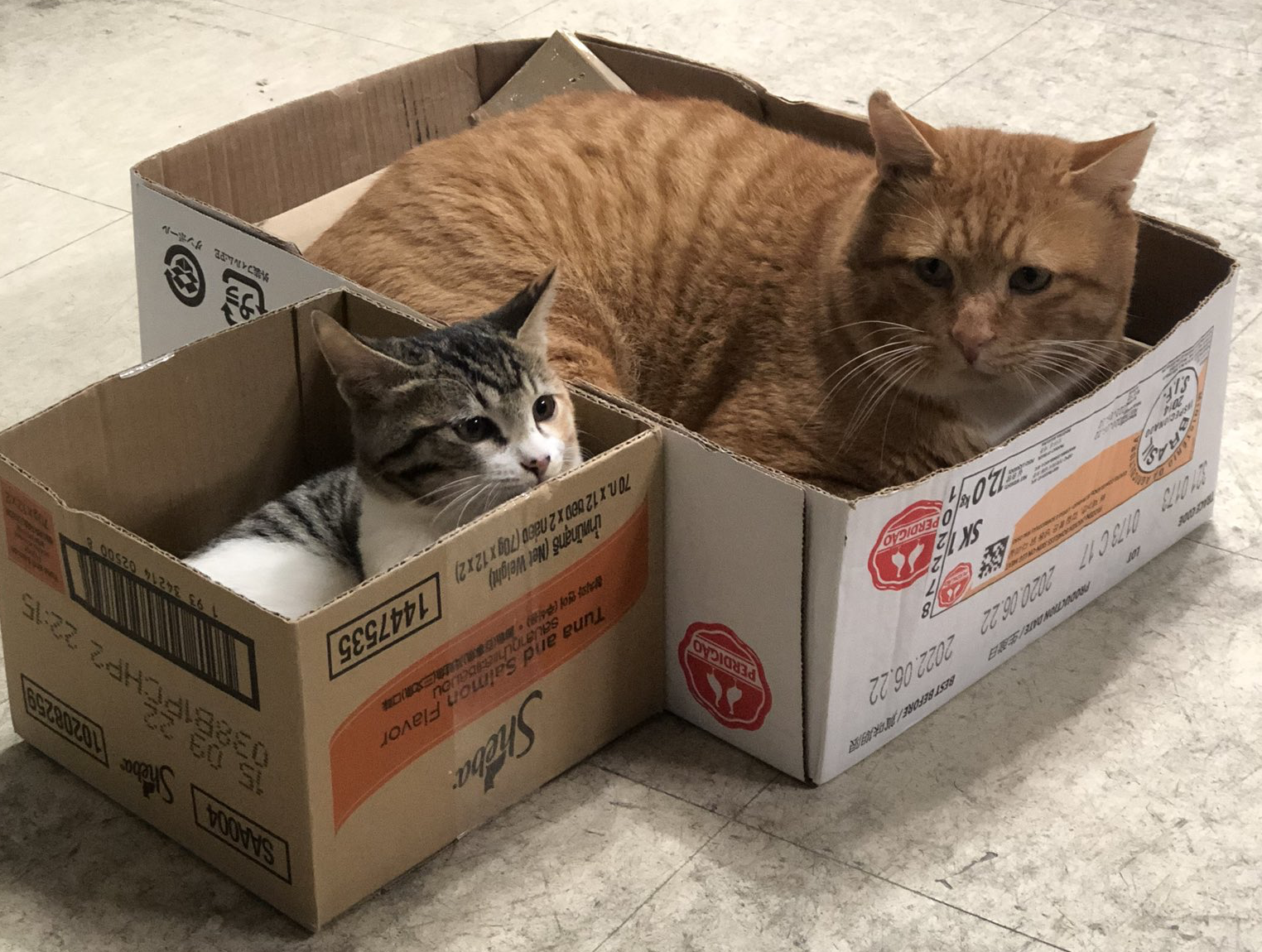
And today, as you read this, the nurse will be going through another hellscape of a day. But feeling a little safer.
As for the rest of the world, the rollout is a bit of an unknown. How, when and who are questions that remain a little foggy. This tweet captured the uncertainty many of us are feeling:
Announcing the vaccine vs. rolling out the vaccine
— Patrick Monahan (@pattymo) 2:11 AM ∙ Jan 5, 2021
With Dennis Nedry’s stressed-out face in mind, I returned to Dr Wiles, to get down to the nitty gritty of what this vaccine is, and what it might mean for the year ahead.
A conversation about the vaccine with microbiologist Dr Siouxsie Wiles.
Hi Siouxsie. I know you’ve done this a thousand times, but can you just for the record explain your profession as a microbiologist and why you’re actually quite good to chat to about vaccines?
At its simplest, a microbiologist is someone who works with or studies microorganisms. Microorganisms, which include viruses, bacteria, and fungi, live in every environment on Earth so that broad definition covers people who work on very different microbes and in very different jobs, from microbiology testing for water and food safety, to diagnostics in hospital labs.
I’m a microbiologist who specialises in bacteria that cause disease in humans, and I work at a university. That means I teach undergraduate and postgraduate students about microbiology as well as run a lab that does research into infectious bacteria.
I’m interested in how infectious bacteria interact with and cause disease in their hosts — something that is crucial for developing vaccines and treatments. I have over twenty years of experience of designing and running microbiology experiments, as well as reading, deciphering, and understanding scientific papers. Because I work with human infectious bacteria, I need to have a good working knowledge of immunology too, which is important for understanding vaccines. But I’m not a vaccine expert so whenever I have any questions I go and talk to my colleagues who are — like Dr Helen Petousis-Harris who specialises in vaccine effectiveness and vaccine safety.
Just for some context — last year in New Zealand you were one of the best communicators about COVID-19. I mean, I’m in awe of your work with Toby Morris that illustrated complicated concepts so clearly in relation to community transmission and so on. I also know you come under so much abuse as a scientist, and as - God forbid - a female scientist. Is there a bit of fucked up feedback that sticks with you? I just ask because you're about to talk about vaccines, so expect some more to come your way!
Its so hard to choose! There are the people who make nasty comments about my weight and hair or because they think I’m doing this to be rich and famous. One woman called me from the USA and left not one, but three messages on my work voicemail yelling at me for not advocating for herd immunity. It turns out my voicemail records for three minutes before cutting out, so she just kept calling back to carry on when her three minutes were up. There’s also guy in Dunedin who is obsessed with my PhD — he hasn’t been able to find a copy in the internet, so he thinks I either don’t have one or am misrepresenting it.
But I think the most fucked up feedback has come from the New Zealand business owners who email to tell me I have the blood of those who’ve lost their businesses because of the pandemic on my hands. One delightful chap has been in touch several times to tell me he is going to ensure that I am prosecuted over my role in New Zealand’s response.
Can you please explain why it’s so important I, as a relatively fit and not too-old person, get vaccinated?
This is where I get all excited about one of the amazing benefits of vaccines: community immunity! The power of vaccination lies not just in the ability of vaccines to protect the people who are vaccinated, but in the protective bubble they can cast over whole communities.
That protective bubble is important, as not everyone is able to be vaccinated. They might be too young, or have an underlying medical condition which would make vaccination potentially unsafe for them.
Even if you think you’ll only have a mild case of an infectious disease, so there’s no point being vaccinated, you could spread it to someone who will have a much more serious infection. And if they are someone who isn’t able to be vaccinated, then you risk doing them serious harm.
It’s all well and good saying you’ll stay away from “vulnerable” people if you are sick. But you may not know who they are. Besides, people with COVID-19 are infectious before they know they have the virus. So, get vaccinated. It’ll help build that protective community immunity bubble that will stop COVID-19 being spread to people who can’t be vaccinated.
Okay — onto the dangers of the vaccine. Do we have any reason to be worried about this vaccine that is rolling out?
For starters, there isn’t one vaccine, there are several. Some are at the approvals stage and others are still making their way through clinical trials. The US and UK are currently rolling out different versions of a new type of vaccine called an mRNA vaccine. The UK is also rolling out a more tried-and-tested vaccine. All the data so far is looking like the vaccines being approved are pretty safe.
With the number of people that need vaccinating, it’s inevitable that some will have a bad reaction. Its also inevitable that some people will have something happen to them health-wise at the same time they get vaccinated, but that has nothing to do with the vaccine.
This is why it is really important any potentially bad reactions are followed up immediately just in case they are related to the vaccine. The sooner we find out about these, the quicker officials can advise who should have which type of vaccine.
For example, people are investigating some cases of severe allergy-like reactions to the Pfizer/BioNTech mRNA vaccine. It looks like they might be due to a compound called polyethylene glycol, or PEG, which is used to package the mRNA.
PEG is used in other drugs and is known to occasionally trigger this type of immune reaction. What this means is that some people who may have been exposed to PEG through other drugs they’ve taken in the past may already have high levels of antibodies against it, putting them at risk of a severe reaction to the PEG in mRNA vaccines. Usually, these severe reactions happen quite fast, and can be reversed with other medications. That’s why people are often asked to hang around for half an hour after they’ve received a vaccine just to be on the safe side.
I hear so much misinformation flying around about the COVID-19 vaccine. Things like “There is no way they could have got a vaccine this fast OMG what is up with that!” What is the bit of misinformation or disinformation that’s stood out to you?
As a microbiologist, it has to be the crap about no-one having been able to isolate the virus, so it can’t exist. There are heaps of people sharing Official Information Act requests from governments and institutions all around the world as their evidence. It would be funny if its wasn’t so fucking serious.
It starts with a microbiologist called Robert Koch who came up with a set of rules (known as Koch’s Postulates) for deciding if a disease is caused by a microorganism. This was 130 years ago, so before we even knew viruses existed. Pretty quickly he and others found exceptions to his rules, so microbiologist have just used them as guidelines ever since.
Anyway, Koch’s second postulate is that the organism must be isolated from a host containing the disease and grown in pure culture. Viruses aren’t like the bacteria that Koch was busy discovering when he formulated his postulates. They need to take over a host cell to replicate. And depending on what proteins a virus has on its surface, it may only be able to infect very specific cells from certain host species, or a wide range of cells from lots of different species. So when microbiologists are trying to isolate a virus from a sample they’ll add it to some cells — usually ones that are relatively easy to grow in the lab — and then look to see if the cells die or if there are any virus particles released into the liquid nutrient bath the cells are growing in.
This is what it means to isolate a virus. But obviously isolate has a different meaning in everyday use: to separate from other things. Some people are using that everyday definition of the word and asking governments, universities, and scientific and academic institutions around the world for their records “describing the isolation of a SARS-COV-2 virus, directly from a sample taken from a diseased patient, where the patient sample was not first combined with any other source of genetic material (like monkey kidney cells aka vero cells; lung cells from a cancer patient).”
In other words, there are people asking for evidence of the existence of the virus responsible for Covid-19 and they are specifically wording their request to rule out getting any evidence that the virus exists. As I said, it would be funny if it wasn’t so serious. Shit like this is the “evidence” people are sharing to prove the pandemic isn’t real.
We know that COVID-19 mutates. What I hear a lot of people saying “why get vaccinated if it’s just going to change?”
Well, it’s not clear yet if any of the changes will actually impact on how effective the vaccine is. Almost all, if not all, of the vaccines make our bodies produce antibodies to lots of bits of the virus’ spike protein. That means that we should make at least some antibodies that will still recognise it. The flipside though is that the longer the virus is allowed to continue infecting people, the more chance there is of mutants arising. So get vaccinated!
How will life look like for those who refuse to get the vaccine? I mean it feels a bit like karma to me as they’ll either risk catching Covid, or passing it onto their grandparents and killing them. Or at the very least be cut off from overseas travel like the silly billies they are. Any thoughts on this?
This is a tough one. When I was younger, I would have been much quicker to jump to your position on karma. But now situations like this just makes me really sad. There are people who choose not to vaccinate because they have genuine concerns after years of experiencing systemic racism from the health system, or having intergenerational memory of their relatives being experimented on.
Then there are people who have been manipulated by deliberate disinformation campaigns about vaccines fuelled by the social media giants’ complete lack of interest in stopping false information being weaponised against us. Both groups need compassion rather than ridicule or hatred. Instead, we need to be working as a society to fix the underlying reasons why people end up being in these positions.
Do you have a go-to line or piece of advice for that relative or friend that casually acts like they are suspicious of a vaccine, or say they won’t get it?
There are plenty of studies that show we’re most influenced by the people we care about. My advice is to approach the person you’re concerned about with humility and kindness and to try to find out what their underlying concern is. Doing that, and reminding them of the values you share are your best chance of helping them, especially if they have fallen for disinformation.
Thanks so much, Dr Wiles.
We’re going to be seeing a lot more disinformation about vaccines this year. And even lil’ New Zealand, a country praised for its COVID-19 response, isn’t immune. This was spotted in Parrs Park, a spot-the-spelling-mistakes nightmare of a scene:
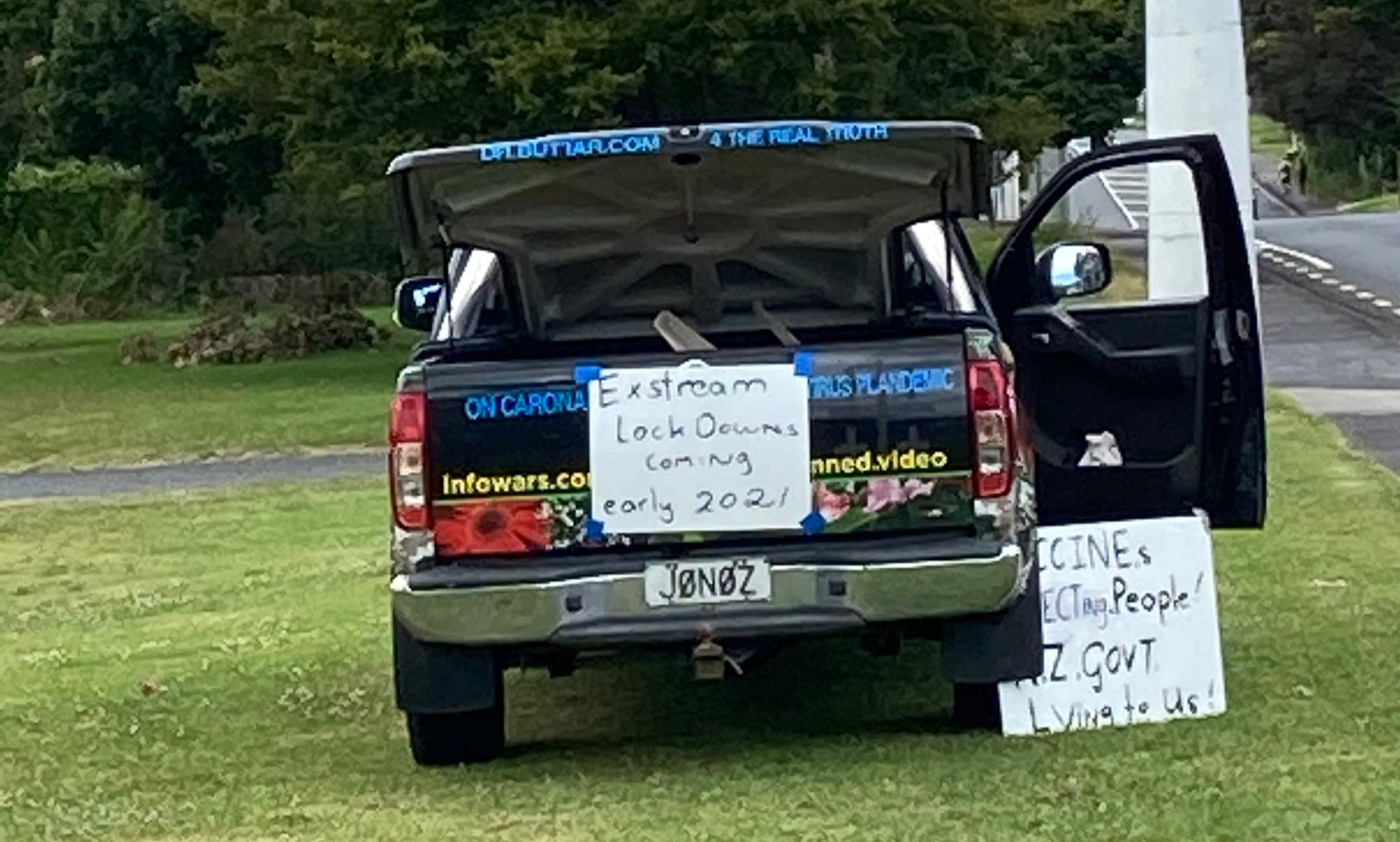
“Exstream” and “Carona” made me laugh quite a bit. I don’t know about you, but I’m not about to take medical advice from someone who can’t spell. And of course we’ll be bombarded endlessly online. Just take this, observed by Mario Fusco:
“Here in Italy people started to share this figure claiming that this is the diagram of the 5G chip that has been inserted in the covid vaccine. In reality it is the electric circuit of a guitar pedal and I believe that putting it in the covid vaccine has been an excellent idea!”

Yes, that’s correct, they left “VOLUME”, “FOOTSWITCH”, “TREBLE” and “BASS” on there. The creators of this bit of rubbish are absolute dimwits. And yet — it spreads.
But in the midst of all this insanity, I’m going to take hope and solace in the scientists, and those who trust them. I’m left with the words of the nurse I talked to. I’m going to try and borrow some of their optimism this year:
“I just take it day by day. I don’t like to try and predict the unpredictable, or set up expectations that could let me down. I always have a looming thought that no matter what, everything will end up okay.”
Maybe one day I’ll ascend to Tae Pyung levels of optimism: Having no care in the world.
But I’m not ready for that just yet. I don’t think any of us are.
David.
